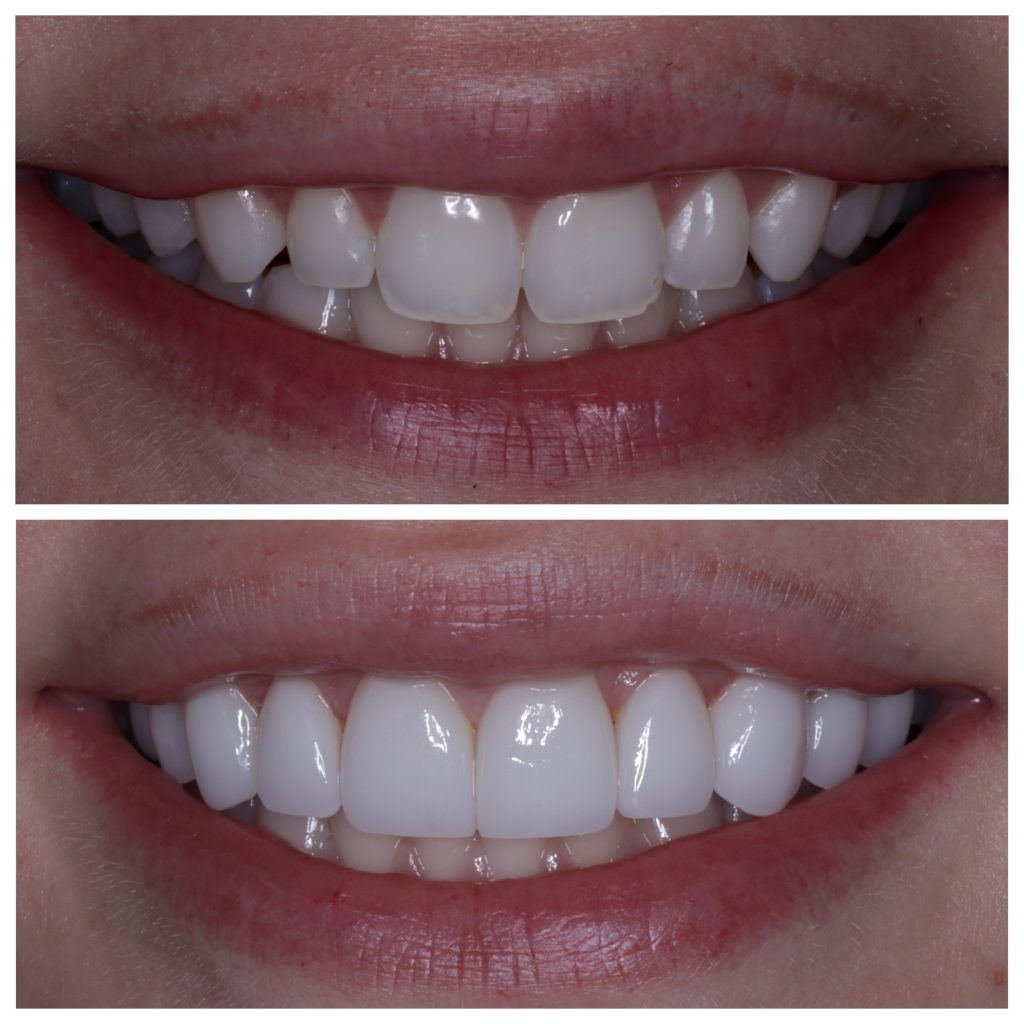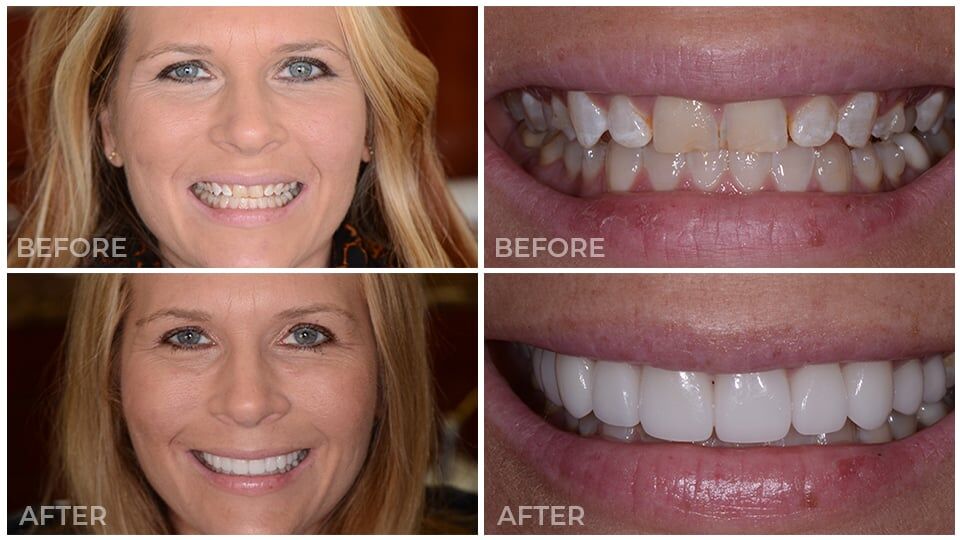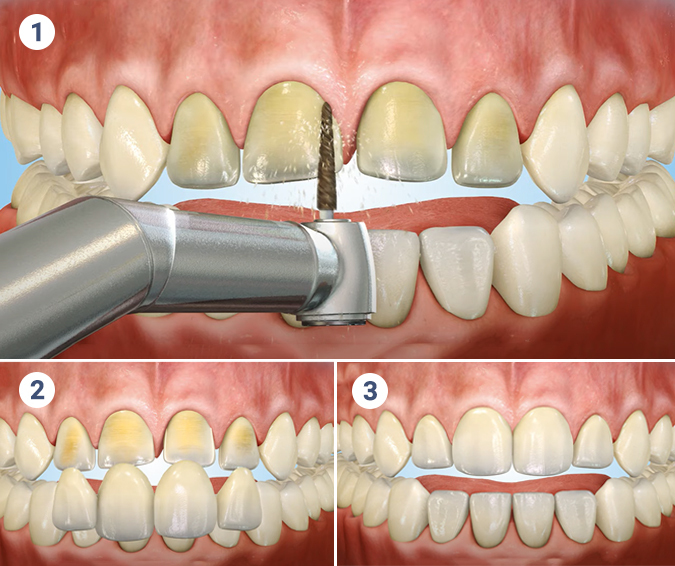How Dental Veneers Can Correct Imperfections Like Gaps and Chips
Wiki Article
Opening the Tricks of Veneers: Facts, Types, and Advantages for a Stunning Smile
Veneers provide an engaging solution for those looking for to improve their smiles. These oral enhancements can deal with various flaws, from staining to misalignment. With choices like porcelain and composite, people can choose based upon their demands and preferences. Understanding the subtleties of veneers, consisting of application and treatment, is important. What variables should one consider prior to making a decision? The answers might shock those interested in this visual oral alternative.
Recognizing Veneers: What Are They?
Veneers are slim, tailor-made coverings created to cover the front surface area of teeth, improving their appearance. Usually crafted from long lasting materials, these shells are customized to fit each individual's teeth specifically. They offer several objectives, including dealing with visual imperfections such as staining, chips, or voids. The application process entails a dental professional preparing the teeth, frequently by eliminating a percentage of enamel to assure a snug fit. As soon as prepared, the veneers are bonded to the teeth making use of a strong adhesive.Clients often choose veneers for their ability to produce a natural-looking smile while supplying a lasting solution to dental imperfections. Unlike various other aesthetic dentistry choices, veneers call for minimal invasive treatments, making them a popular option. The outcome is an enhanced smile that can substantially boost a person's self-confidence and self-esteem. On the whole, veneers provide an efficient technique to achieving an extra harmonious and attractive dental appearance.
Sorts of Veneers: Porcelain vs. Compound
When taking into consideration aesthetic oral choices, 2 main sorts of veneers stick out: porcelain and compound. Porcelain veneers are crafted from a sturdy ceramic product that resembles the natural look of teeth. They are recognized for their tarnish resistance and ability to show light in a similar way to all-natural enamel, giving a visual appeal that many patients desire. The application process commonly entails even more prep work of the tooth structure and might call for multiple sees to the dental professional.On the other hand, composite veneers are made from a tooth-colored resin that is straight applied to the teeth. This type allows for quicker application and can typically be completed in a solitary browse through. While they are less costly than porcelain veneers, they might not provide the very same longevity or resistance to staining. Eventually, the selection between porcelain and composite veneers depends on individual preferences, spending plan, and particular dental requirements.
The Benefits of Deciding On Veneers
Selecting veneers provides numerous benefits that can considerably improve both the looks and capability of a person's smile. Among the main advantages is their ability to remedy imperfections such as staining, voids, and misalignment, causing a more consistent look. Veneers can also boost the resilience of teeth, offering a safety layer that shields them from damage.Furthermore, they call for very little tooth prep work contrasted to other oral procedures, protecting even more of the all-natural tooth framework. This conservation contributes to a healthier oral environment while still accomplishing a sensational smile.
Veneers are highly personalized, enabling people to choose the shape, dimension, and shade that finest matches their choices. Additionally, they are stain-resistant, making it simpler to preserve a attractive and intense smile with time. In general, veneers provide an effective choice for those looking for both aesthetic improvement and long-term oral wellness advantages.
The Veneer Application Refine
The veneer application process includes a number of crucial actions to assure suitable results. A consultation is conducted to evaluate the individual's requirements, adhered to by the prep work and shaping of the teeth. Finally, the veneers are adhered in position, with modifications produced an ideal fit and appearance.Initial Consultation Tips
A complete first consultation is crucial for any individual thinking about veneers, as it sets the structure for an effective treatment. During this meeting, the oral expert evaluates the individual's oral wellness, going over any kind of existing problems that could influence the veneer application. This analysis may consist of X-rays and a visual examination to establish the condition of the gum tissues and teeth.The dental professional also involves the person in a comprehensive conversation concerning their visual goals, choices, and assumptions. They might provide various veneer choices tailored to the client's specific needs. Furthermore, the professional discusses the procedure, potential dangers, and aftercare requirements, guaranteeing that the patient is comfortable and knowledgeable prior to waging the therapy.
Prep Work and Shaping Teeth
After the first assessment, the next phase involves the preparation and shaping of the teeth to accommodate the veneers. This important action is performed by the dental expert, who very carefully analyzes the tooth framework to establish the quantity of enamel that needs to be removed. Usually, a slim layer, typically around 0.5 millimeters, is slashed off to assure a correct fit for the veneers. Accuracy is paramount during this process, as it affects both the aesthetic result and the general convenience. As soon as the teeth are properly shaped, perceptions are required to create custom veneers that align perfectly with the individual's dental profile. This precise preparation sets the stage for an effective veneer application, boosting both look and feature.Bonding and Last Adjustments
Following the shaping and preparation of the teeth, the bonding process starts, noting an essential phase in the veneer application. Throughout this phase, a dental adhesive is used to the ready tooth surface, ensuring a solid bond in between the tooth and the veneer. The dental expert thoroughly recommended you read positions the veneer, making changes to achieve the wanted positioning and visual appeals. Once correctly positioned, a special light is utilized to cure the sticky, solidifying the bond. After treating, the dental expert carries out final changes, cutting any type of excess material and improving the veneer's shape to guarantee a natural look. This cautious focus to detail improves both feature and looks, adding to a general stunning smile that is long lasting and lasting.Caring for Your Veneers: Upkeep Tips
Taking care of veneers is vital to maintain their look and longevity. A constant daily cleansing regimen, mindful avoidance of staining foods, and regular oral examinations are key parts of efficient maintenance. These techniques aid assure that veneers stay in peak problem and continue to boost one's smile.Daily Cleaning Routine
Routinely keeping veneers is crucial for their durability and look. A correct day-to-day cleaning regimen can help protect their shine and stop damage. Dental practitioners recommend cleaning twice a day with a soft-bristled tooth brush and fluoride toothpaste, ensuring that all surfaces are cleaned up gently to prevent scraping the veneer surface area. Flossing daily is likewise essential to remove food bits and plaque from between teeth, where brushes may not get to. In addition, utilizing an antimicrobial mouth wash can help preserve oral health without damaging the veneers. It important site is recommended to avoid rough cleaners and tools that can scratch the veneer. By complying with these straightforward steps, people can maintain their veneers looking beautiful while promoting general dental health.Avoiding Staining Foods
Although veneers are designed to improve the look of teeth, their susceptibility to tarnishing requires mindful nutritional selections. It is crucial for people with veneers to be conscious of specific foods and drinks that can cause discoloration. Dark-colored products such as coffee, merlot, and berry juices ought to be consumed in moderation, as they are known to stain both natural teeth and veneers. In addition, acidic foods like citrus fruits container weaken the bonding representatives utilized in veneers, making them much more prone to discoloration. To maintain a bright smile, it is recommended to rinse the mouth with water after eating discoloration foods and to exercise regular dental hygiene. These thoughtful choices add considerably to the longevity and looks of veneers.
Regular Oral Check-ups

Maintaining the integrity of veneers requires a dedication to regular dental check-ups, as these consultations play an essential function in ensuring their durability and look. Throughout these check outs, dental professionals can evaluate the condition of the veneers, looking for any kind of signs of wear, damage, or underlying dental concerns. Additionally, regular cleanings assist remove plaque and tartar that can gather around the veneers, advertising general dental health and wellness. Dentists can also offer customized recommendations on treatment methods and products matched for veneer upkeep. By sticking to a timetable of exams, people can deal with possible issues early, guaranteeing their smile remains vibrant and attractive. Inevitably, routine dental visits are a vital component of veneer treatment.
Is Veneers the Right Choice for You?
Choosing whether veneers are the right choice often rests on private oral requirements and aesthetic objectives. For those seeking to resolve problems such as staining, chips, or misalignment, veneers blog here can offer a transformative solution. Prospects generally include individuals with healthy and balanced teeth yet prefer an enhanced smile.
However, it is vital to take into consideration factors such as tooth enamel condition, the extent of oral concerns, and the determination to keep veneers - Porcelain Veneers. Consulting with an oral specialist is vital, as they can assess dental wellness and determine if veneers are appropriate
Furthermore, prospective candidates should assess the long-term commitment, as veneers may need substitute every 10-15 years. Price factors to consider additionally play a substantial duty, as veneers can be a significant financial investment. Inevitably, the choice needs to be knowledgeable, stabilizing visual needs with practical factors to consider for long-term results.
Frequently Asked Questions
Exactly How Long Do Veneers Typically Last Prior To Needing Substitute?
Veneers typically last in between 10 to 15 years before requiring substitute. Aspects such as dental health, lifestyle choices, and material high quality can affect their longevity, making routine dental exams crucial for maintaining their problem.Are Veneers Safe for Individuals With Delicate Teeth?
Veneers can be secure for individuals with delicate teeth, however it often depends on the severity of level of sensitivity and the dental professional's method. Consulting an oral expert prior to continuing is important to assure optimal outcomes.Can Veneers Be Gotten Rid Of or Replaced Conveniently?

Do Veneers Stain In Time, and Exactly How Can I Stop It?
Veneers can discolor in time, especially from foods and beverages like coffee or red a glass of wine. To avoid staining, keeping great oral hygiene, utilizing a straw for drinks, and normal oral cleanings are advised techniques.What Is the Expense Array for Obtaining Veneers?
The cost of veneers generally ranges from $500 to $2,500 per tooth, relying on aspects such as material kind, dental expert experience, and location. Individuals must consult with dental specialists for personalized quotes and financing options.As soon as the teeth are adequately shaped, impressions are taken to create customized veneers that align perfectly with the client's oral account. Throughout this stage, an oral adhesive is used to the ready tooth surface area, guaranteeing a strong bond between the tooth and the veneer. It is crucial to take right into account aspects such as tooth enamel problem, the extent of dental concerns, and the desire to maintain veneers. Veneers can be safe for individuals with delicate teeth, but it usually depends on the severity of sensitivity and the dental professional's strategy. The cost of veneers usually ranges from $500 to $2,500 per tooth, depending on variables such as material type, dental professional experience, and location.
Report this wiki page